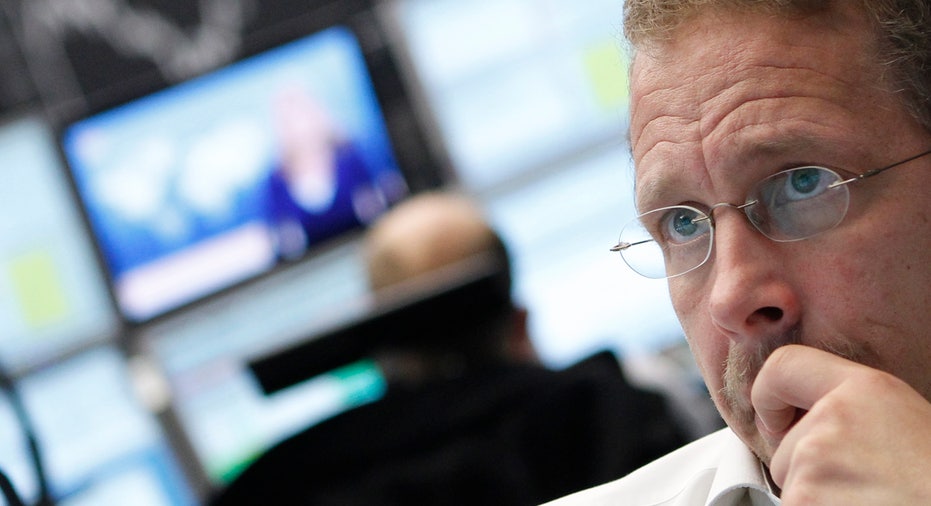Global Markets Brace for Packed Week

Global stocks and the euro dipped on Monday as investors cashed in some of last week's sharp gains ahead of a German ruling on the euro zone's new bailout fund, Dutch elections and potential new stimulus from the U.S. Federal Reserve.
The European Central Bank's statement last week that it was prepared to buy an unlimited amount of strained euro zone government bonds pushed European shares to a 13-month high and the euro to a four-month high on hopes it could mark a turning point in the bloc's 2-1/2 year crisis.
Investors started the week by taking some of that profit off the table. The FTSEurofirst index of European equities was down 0.15 percent by 0930 GMT, with the euro and stock markets in London, Paris and Frankfurt all slightly lower.
Europe faces another testing week, with Dutch voters going to the polls and Germany's constitutional court set to rule on new powers for the European Stability Mechanism, the euro zone's new bailout fund, both on Wednesday.
Since ECB President Mario Draghi first mooted the ECB's new crisis plan on July 26, world stock markets have rallied more than 8 percent, euro zone blue chips have jumped almost 20 percent and the euro has risen more than 4 percent. Analysts are wondering whether the gains can continue.
"The Draghi effect obviously helped the markets hugely, so people are likely to be a bit more hesitant this week," said Hans Peterson global head of investment strategy at SEB private banking.
"Risk appetite is likely to be on the way up, but we have to clear some hurdles, and the things in Europe have to go according to plan. The key issue this week is the approval of the ESM by the German constitutional court."
Strategists at Goldman Sachs also issued an upbeat note on equities, saying that while there were worries over China's wobbling growth, the brighter European news and signs of gradual improvement in the U.S. were both positives.
"There is still room for market rallying," they said, citing their target for the Eurostoxx 50 to hit 2,700 points in the next 12 months. "From current levels, however, we expect further gains through to year-end, but at a slower pace," they added.
BOND FOCUS
U.S. stock index futures pointed to a lower open on Wall Street, with futures for the S&P 500 down 0.29 percent, Dow Jones futures down 0.25 percent and Nasdaq 100 futures down 0.26 percent.
The euro followed the trend, easing against the dollar , but stayed close to a near four-month high hit on Friday after below-forecast U.S. jobs data fanned speculation the Federal Reserve may launch more monetary stimulus this week.
Hopes that powerful ECB Italian and Spanish bond market intervention could finally draw an end to the seemingly endless euro crisis has seen massive upward shifts across global markets, from European stocks and treasuries to commodity-reliant economies.
Spanish 10-year yields have tumbled more than two percentage points from an unsustainably high 7.8 percent to around 5.6 percent, while the reduced demand for safe-haven German debt has pushed equivalent yields up 36 bps from their record lows to stand at 1.48 percent.
The ECB's German Bund futures rose in choppy moves on Monday, supported by worries over Greece's fiscal repair plans and Fed aid hopes lifting demand for U.S. treasuries.
SEB's Peterson said it was still uncertain whether the U.S. central bank would act and cautioned that any new support was likely to provide a only temporary rather than a long-term lift.
"What is really important here is the wider macro picture, whether the euro zone sorts itself out and what happens in China and Asia," he added.
Fresh data from China on Monday showed exports grew at a slower pace than forecast last month while imports surprisingly fell, underlining weak domestic demand as the global economic outlook dims.
Oil markets are riding high, underpinned both by hopes that economic stimulus around the world will fuel growth and geo-political tensions in parts of the Middle East, the world's most important oil-producing region.
Brent crude futures for October delivery were trading 54 cents higher at $114.79 per barrel by 0959 GMT, after settling up 76 cents on Friday. U.S. crude was trading up 4 cents at $96.46 per barrel.
"Chinese data had been expected to be weak, so to some extent it has been taken into account in oil prices, but having said that, it basically caps the upside," said Masaki Suematsu, energy team sales manager at Newedge Japan.



















